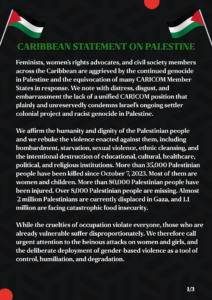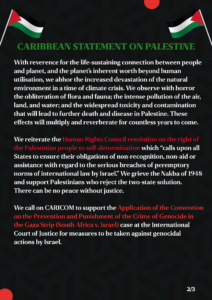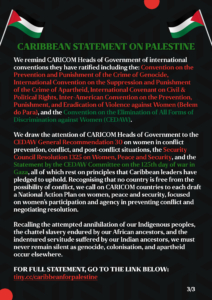THE Inter-American Convention on the Prevention, Punishment, and Eradication of Violence against Women, also known as the Belém do Pará Convention was adopted on June 9, 1994. Belém do Pará is now 30 years old and has been ratified by 32 of the 34 member states of the Organization of American States (OAS). The Bahamas ratified the Convention, obligating it to prevent, investigate, and punish violence against women.
In Article 1, Belém do Pará defines violence against women as “any act or conduct, based on gender, which causes death or physical, sexual or psychological harm or suffering to women, whether in the public or the private sphere”. In Article 2, it elaborates with the specific inclusion of violence that “occurs within the family or domestic unit or within any other interpersonal relationship, whether or not the perpetrator shares or has shared the same residence with the woman”, “occurs in the community and is perpetrated by any person” including harassment in the workplace and other institutions, and “is perpetrated or condoned by the state or its agents regardless of where it occurs”.
In addition to the specific mention of the public and private spheres in Article 1, Article 3 specifically states the right of every woman to be free from violence in both the public and private spheres. Article 3 also draws attention to State-condoned violence and, in the Bahamian context, makes it necessary to look at laws that discriminate against women and exclude particular acts of violence or perpetrators of violence.
Articles 1 to 3 are easily applied to the issue of marital rape in The Bahamas and the flimsy excuses put forward by successive governments and anti-rights groups who insist, implicitly, that women are not full human beings and there should be exceptions when violence is perpetrated at home and by spouses. Violence against women is clearly defined, and the Convention explicitly states, twice, that women have the right to be free from violence in the public and private spheres, and perpetrated by any person. This means states are obligated to prevent, investigate, and punish violence enacted against women in the home and violence enacted against women by their spouses.
Articles 7 to 9 are specific to the duties of State Parties. These include their obligation to:
1. apply due diligence to prevent, investigate and impose penalties for violence against women
2. include in their domestic legislation penal, civil, administrative and any other type of provisions that may be needed to prevent, punish and eradicate violence against women and to adopt appropriate administrative measures where necessary (This includes the gender-based violence bill, recommended by the CEDAW Committee in 2018 and by member states in the Universal Periodic Review process in 2023. The government committed to pass the bill, but stopped consultation, abandoned the bill, and passed the “Protection Against Violence” Act which does not, in any way, address the specific issue of gender-based violence.)
3. take all appropriate measures, including legislative measures, to amend or repeal existing laws and regulations or to modify legal or customary practices which sustain the persistence and tolerance of violence against women (This includes the amendments to the Sexual Offences Act, removing “who is not his spouse” from the definition of rape, repealing section 15 on “sexual assault by spouse”, adding a statutory definition of consent, and adding a clause of non-immunity on the basis of marriage.)
4. promote awareness and observance of the right of women to be free from violence, and the right of women to have their human rights respected and protected (The CEDAW Committee has recommended that the government ensure that women and girls are aware of their human rights, particularly under the Convention, and there has been no movement toward this in the five years since.)
5. modify social and cultural patterns of conduct of men and women, including the development of formal and informal educational programs appropriate to every level of the educational process, to counteract prejudices, customs and all other practices which are based on the idea of the inferiority or superiority of either of the sexes or on the stereotyped roles for men and women which legitimise or exacerbate violence against women (Related to the previous point, there is no plan and there has certainly been no action by the government to address the issue of gender stereotyping and harmful ideology. This, too, is an obligation through CEDAW, and one that is critical to preventing violence against women and girls.)
6. to ensure research and the gathering of statistics and other relevant information relating to the causes, consequences and frequency of violence against women, in order to assess the effectiveness of measures to prevent, punish and eradicate violence against women and to formulate and implement the necessary changes (The gender-based violence, which was never passed, should have included a system for recording and analysing incidents of violence against women and, in particular, femicide, in order to identify risk factors and trends which would aid in developing effective prevention and intervention.)
The Belém do Pará is not often discussed in The Bahamas. We have generally been more attentive to the United Nations human rights mechanisms. While they are useful, it is important that we make better use of regional mechanisms and find ways to learn from other countries in the region that have had success in reducing violence against women and in implementing the Convention in effective ways.
That 30 years have passed since The Bahamas ratified the Convention and few people recognise its name, much less know what it is about and what it contains is a failure of successive government administrations. It is, as we know, not enough to participate in multilateral processes, sign and ratify documents, make commitments, and occasionally report. The general public needs to be made aware of the obligations of the government to protect and expand our human rights. We need to know our rights and how to access them. We need to have a clear understanding of the existing national legislation and how it is contravention with international commitments. We, importantly, need to know that these commitments are to us, and not to an institution. The institutions are vessels and, yes, motivators, and we, the people, are rights holders. It is our right to know our rights, and it is the obligation of the government to ensure that we know them and access them fully.
Published in The Tribune on June 12, 2024.





